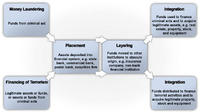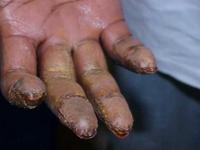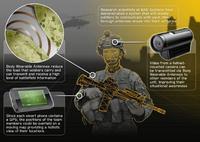-
Severe drought in Georgia, 150 counties declared disaster areas
A severe drought and excessive heat has forced the U.S. Department of Agriculture to declare 150 counties in Georgia as primary natural disaster areas; the drought began on 15 April and has caused farmers to lose more than 30 percent of their pasture, grain crops, cotton, peanuts, tobacco, and forage crops
-
-
Combating the financing of terrorism

Terrorist organizations rely on financing and support networks to sustain operations and launch attacks. The U.S. Department of the Treasury has developed a sophisticated and comprehensive approach to identify, disrupt, and deter the funding networks of terrorist organizations
-
-
Sea level rise to take economic toll on California coast
California beach towns could face hefty economic losses caused by sea level rise, according to a new state-commissioned study; the study estimates the cost of coastal storm damage and erosion, both of which are expected to increase as sea levels rise
-
-
New technology detects altered fingerprints

The widespread use of fingerprint recognition systems has led some individuals to disfigure or surgically change their fingerprints to mask their identities; new technology can help law enforcement and border control officials detect these altered fingerprints
-
-
Emergency cleanup plans for potential Cuban oil spill
With Cuba set to begin offshore drilling, the former head of the Environmental Protection Agency (EPA) is pressing the United States to immediately begin developing emergency plans to assist Cuba in the event of a major oil spill
-
-
$1.1 million order for Implant Sciences' portable explosives detectors
Implant Sciences Corporation, a developer of explosives detection technology, recently announced that it had received a $1.1 million order for its portable explosives detection systems; with the latest purchase, Implant Sciences will supply its Quantum Sniffer QS H-150 portable devices to the Middle East for use by critical infrastructure operators
-
-
General Dynamics to integrate CBRN device in Army radios
General Dynamics C4 Systems announced last week that it will work with U.S. Army researchers to install wireless-networking chips on radios that can also detect the presence of dangerous chemicals on the battlefield
-
-
Body wearable antennas for soldiers, first responders

Body Wearable Antennas (BWAs) allow soldiers to communicate with their colleagues on the front line without the need for conventional radio whip-antennas which can be cumbersome and conspicuous; NWS can also be incorporate into the suits of fire-fighters for use during search and rescue, for police patrol team members to have the GPS locations of their colleagues, and in other hazardous industries such as mining, oil, and gas
-
-
Doppelganger Domains threaten 30 percent of Fortune 500 companies
30 percent of Fortune 500 companies are vulnerable to Doppelganger Domains attacks; a Doppelganger Domain is a domain spelled identically to a legitimate fully qualified domain name (FQDN) but missing the dot between host/subdomain and domain, to be used for malicious purposes
-
-
9/11 generates growth of homeland security college programs

The 9/11 attacks led to a flurry of spending not only on defense and homeland security needs, but also education; in recent years dozens of homeland security programs have emerged at community colleges, universities, and graduate schools across the country and thousands of students have flocked to these new programs lured by the promise of jobs
-
-
Decade after 9/11, infrastructure interdependence a major problem for U.S.
After years of study of the impact on infrastructure of the 9/11 attacks, a groups of experts paints a disconcerting picture of major infrastructure systems that were highly dependent upon one another; even today, these experts see this deep interdependency as a liability and threat to national security and the quality of life for its citizens
-
-
General Dynamics teams up with Virginia Tech to bolster cybersecurity
Defense giant General Dynamics’ cybersecurity division has teamed up with Virginia Tech to help strengthen the nation’s cybersecurity research capabilities; on Wednesday, the company announced that its Advanced Information Systems branch will assist Virginia Tech with its new Security and Software Engineering Research Center (S2ERC)
-
-
BAE Systems shows invisibility cloak-wrapped vehicle
BAE Systems has tested an invisibility cloak that allows a vehicle to blend into its surroundings; sheets of hexagonal “pixels,” which can change temperature very rapidly, allow vehicles — even moving tanks — to match their surroundings, thus making them invisible
-
-
Exports of U.S. advanced technology products suffer less in recession
Advanced technology products (ATP) exports fell from $270 billion in 2008 to $245 billion in 2009 — but this 9 percent drop was less than half the decline of non-ATP exports
-
-
Terrahawk showcases its mobile surveillance vehicle
This Thursday Terrahawk, LLC will show off its Mobile Utility Surveillance Tower (MUST) to members of the U.S. House of Representatives and the Senate along with their staffs; with MUST, law enforcement agencies can quickly set up a mobile surveillance tower for emergency response, crowd control, or general surveillance
-
More headlines
The long view
Ransomware Attacks: Death Threats, Endangered Patients and Millions of Dollars in Damages
A ransomware attack on Change Healthcare, a company that processes 15 billion health care transactions annually and deals with 1 in 3 patient records in the United States, is continuing to cause massive disruptions nearly three weeks later. The incident, which started on February 21, has been called the “most significant cyberattack on the U.S. health care system” by the American Hospital Association. It is just the latest example of an increasing trend.
Chinese Government Hackers Targeted Critics of China, U.S. Businesses and Politicians
An indictment was unsealed Monday charging seven nationals of the People’s Republic of China (PRC) with conspiracy to commit computer intrusions and conspiracy to commit wire fraud for their involvement in a PRC-based hacking group that spent approximately 14 years targeting U.S. and foreign critics, businesses, and political officials in furtherance of the PRC’s economic espionage and foreign intelligence objectives.
European Arms Imports Nearly Double, U.S. and French Exports Rise, and Russian Exports Fall Sharply
States in Europe almost doubled their imports of major arms (+94 per cent) between 2014–18 and 2019–23. The United States increased its arms exports by 17 per cent between 2014–18 and 2019–23, while Russia’s arms exports halved. Russia was for the first time the third largest arms exporter, falling just behind France.
LNG Exports Have Had No Impact on Domestic Energy Costs: Analysis
U.S. liquified natural gas (LNG) exports have not had any sustained and significant direct impact on U.S. natural gas prices and have, in fact, spurred production and productivity gains, which contribute to downward pressure on domestic prices.
